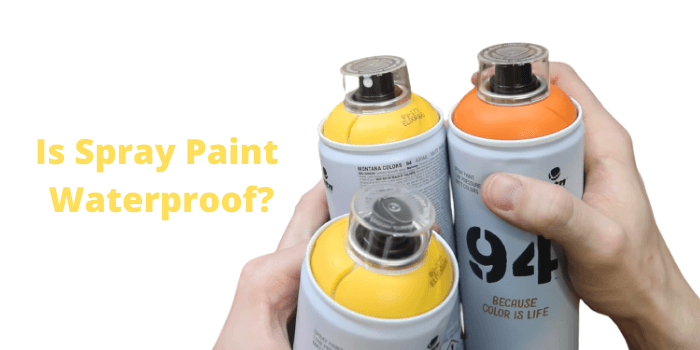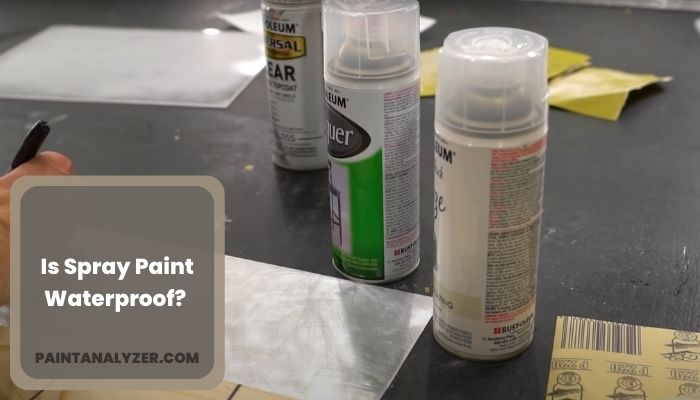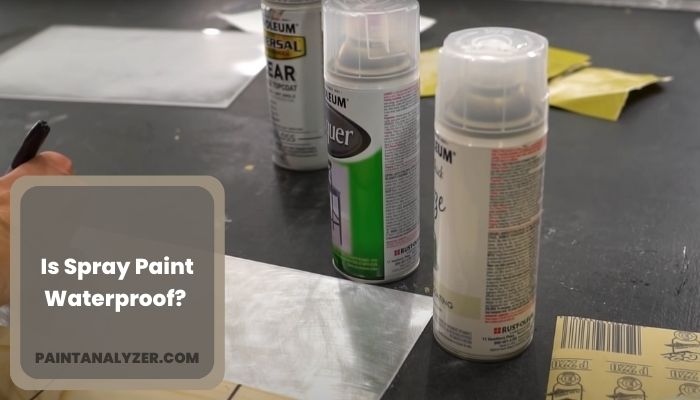From painting school walls as kids to practicing graffiti in the backyard, spray paint never fails to disappoint our whims. It’s one of the easiest ways to practice painting and to apply it without getting into the boring painting rules. But is spray paint waterproof in the least?
Spray paint isn’t always inherently waterproof. You can wash off normal spray paint by simply using a lukewarm soapy concoction. However, you can find industrial-grade, specifically designed for outdoor usage types of paint too. They are quite waterproof, and as a result, can withstand the outside aggravation much longer.
In today’s article, let’s go over the different kinds of spray paint and their proper usages. Additionally, we’ll also find the answer to the ‘how to make paint waterproof?’ question.
Is Spray Paint Waterproof?
In most cases, spray paint isn’t waterproof. However, you can find both water-soluble and water-resistant spray paint cans in the market. There are different types of spray paint depending on the primary components in it.

Here are a few examples of the soluble types:
- Chalkboard Spray Paint
Chalkboard spray paint has an opposable contrast to general spray paint. Due to the presence of talc and silica in it, it actually absorbs vapor from the atmosphere. As such, it’s heavily prone to get damaged by water.
- Acrylic Spray Paint
Acrylic is more or less washable unless you’ve already applied a top coating of sealant on it. It’s not as water-soluble when it’s dry though.
Related Post: Acrylic paint drying time
- Frosted Spray Paint
By definition, this paint doesn’t react much to room temperature water or moisture. But soak the paint in hot water with liquid detergent for a while and the layers will come tumbling down.
Different Types Of Waterproofing Paint
You can find waterproof spray paint within an affordable price range as well. Before purchasing, always check the label to see if it mentions eligibility for outdoor usage. If it does, then rest assured that it’s water-resistant.
- Epoxy Spray Paint
Epoxy lacks longevity since it doesn’t take much heat to loosen the polymer bonds. Nevertheless, since epoxy has a plastic-like consistency, it doesn’t react much with water.
- Rustoleum Spray Paint
Rustoleum or any rust-proof spray paint is, by definition, very resistant to water or moisture. They’re great for metal pipes and super durable.
- Enamel Spray Paint
Enamel is pretty much an upgraded version of the epoxy spray paint. Besides being waterproof, it can tolerate high heat as well.
- Automotive Paint
Specialized automotive paint can prevent oxidation and rust on the vehicle exterior. Needless to say, the presence of integrated primer in such acrylic-based automotive spray paint ensures waterproof abilities.
Can Spray Paint Wash Off With Water?
Spray paint will gradually wash off or fade away with water if –
- it’s a water-based paint
Water-based spray paint is extremely soluble in water. Oil-based paint, on the other hand, has resin-like consistency during application. Furthermore, the alkyd bonds can’t break down in the water. In the previous case, however, there are no such strong bonds, so it easily washes off.
- it hasn’t still dried
Spray paint is the most vulnerable when it’s still wet from the application. Even oil-based automotive paint will somewhat wash off or scatter away if you use water while it’s still wet.
Does Spray Paint Wash Off In The Rain?
If the scenario fulfills any of the aforementioned two criteria, the spray paint will wash off in the rain. However, a few other factors can play important roles as well.
Rainwater can sometimes feel very acidic, depending on the atmosphere’s irregularities. When this happens, the rainwater can somewhat corrode the layers of the spray paint. Again, long-term exposure to the drizzle can also soften up the paint and cause it to peel off.
How Can You Make Spray Paint Waterproof?
You’ve already heard your share of the ‘is spray paint waterproof?’ debate. Fortunately, it’s possible to make the water-soluble spray paint somewhat waterproof as well.
You can make spray paint waterproof by using –
- primers
- sealants
- varnishes
- sealing spray, etc.
You can use primer only to ensure reasonable water-resistant properties. Applying a top-coating of premium quality sealant will help you achieve both durability and reliability.
Lastly, varnishing off the entire surface or the furniture is simply the cherry on top. With proper varnishing, you would hardly need to worry about any discoloration or quality issues.
How Long Can Spray Paint Last Outdoors?
The longevity of spray paint outdoors depends on multiple factors like constant exposure to high heat, humidity, etc. Friction or abrasion can greatly reduce durability alongside heat.
You can expect quality spray paint to remain in peak condition for around four to six months. It’ll start to show signs of discoloration after this period. Again, without much intervention, the paint can last for five-six years even.
Related: How Long Does Acrylic Paint Last?
Is Rustoleum Spray Paint Waterproof?
Rustoleum spray paint is indeed waterproof. Even now, it’s the very first item any experienced painter keeps in their art bucket. Hence, if you too are looking for reliable spray paint cans for day-to-day operations, go for Rustoleum without any hesitation.
Here’s why the Rustoleum spray paint has water-resistant properties:
- It primarily comprises an oil-based formula
- The inner oily consistency can seal off the upper layer to prevent water from getting in
- The heavy paint is comparatively harder to remove from the surfaces, i.e. isn’t washable
Besides having water-resistant properties, the Rustoleum spray paint is also rust-proof. As such, it lasts a lot longer than the usual marketable spray paint cans. Also, it’s near-perfect to apply on solid surfaces like direct metal, metal pipes, PVC pipes, duct lines, etc.
Is Krylon Spray Paint Waterproof?
Like Rustoleum, Krylon is another well-known name in the spray paint world, and for very good reasons. Krylon spray paint comes with appropriate water-resistant properties. From furniture and walls in the household to concrete slabs, you can easily use them anywhere.
You can also find decorative paint in different colors to dazzle up your outdoor furnishings. The paint takes around an hour only to dry completely. And once it does, even heavy rain and the scorching sun can’t dull down the color.
Spray Paint Application: Tips To Follow
Just as the devil lies in the details, the longevity of any paint lies in the application procedure. Here are a few essential application tips that can follow to increase the paint durability:
Clean The Surface
If there’s dirt on the surface, the paint will not settle in properly. If you spray without cleaning, you may end up finding loose paint flecks all over the surface. Even microscopic dust particles can hamper the application process.
They stand as obstacles in the way of the paint and the surface bond. So, always clean the surface thoroughly before spray painting on it. Just some warm soapy concoction should do the trick and loosen up the dirt. Dry the surface properly with a towel before applying the paint.
Sand The Surface
Always sand over the surface thoroughly whether it’s a wooden canvas, fence, wall, etc. Sanding ensures the smoothness of the surface which is highly necessary for full coverage. With metal, sanding isn’t necessary but you should inspect the surface for fixable bumps.
Use Primers
If you’re using top-notch spray paint from reputable brands, you won’t ideally need primers separately. Outdoor-approved paint already contains some sort of internal primer. But if you’re tense about the paint washing off, you can still apply another layer of primer later.
Take Breaks
With spray painting, layering is very important. Too many layers will make the paint look unappealing and bumpy. Again, you can end up spraying too much on one part of the surface and significantly less on the other. So, avoid rushing through the layering of the spray paint.
You should also provide ample time for one layer to dry before you can apply the next. Taking breaks will help you to determine the required number of layers as well.
Follow Given Directions
It’s important to remember that different brands can often provide a different set of instructions. Even if you’re a veteran spray painter, read the instructions on the can thoroughly to avoid accidental mistakes during application.
Use Sealants
Using proper sealants will allow you to achieve longevity and much-needed paint clarity. By using glossy sealant, you can get a pretty gloss-like finish to the result. Hence, to ensure the waterproof durability of the spray paint, use appropriate sealants after completion.
Preparing Waterproof Spray Paint: Precautions
Here are a few precautions you should actively follow while working with spray paint:
- Wear a full-body suit including gloves, masks, and eye covers to prevent irritation
- Don’t use the paint directly on your skin
- Don’t spray over dirty areas without cleaning it
- While spray painting, arrange for proper ventilation so you don’t go through suffocation
- Make sure to not spray over a certain area of the surface for too long
- Don’t spray paint near an open fire or high-temperature regions under any circumstances

Frequently Asked Questions
Q: Is oil-based paint waterproof?
Oil naturally repels water. Oil-based spray paint will leave a protective layer on top during and after finishing spraying. Even hot water can’t loosen the alkyd bonds in this layer that easily. Hence, oil-based paint is extremely waterproof.
Q: How long does it take for Rustoleum spray to dry completely?
It takes at least 24 hours for rust-oleum spray paint to dry completely. Depending on the humidity in the air, it can take even longer. When there’s a lot of water vapor in the atmosphere, the paint can’t develop enough latent heat in time. Hence, it takes longer to dry.
Q: Does waterproof spray paint dry slowly?
Waterproof spray paint has a thicker consistency so it takes a little longer to dry off. If normal spray paint takes around 30-35 minutes, then the waterproof ones will take around 45-60 minutes to dry completely.
Q: Does rain damage spray paint when it’s dry?
If it’s top-quality spray paint, a little rain can’t really harm it, especially when it’s dry. The spray paint gets somewhat embedded within the surface after it has dried off. If it’s acrylic-based, it’ll get a plastic-like consistency.
In this state, the paint will remain intact whether it’s a drizzle or a heavy pour. Day-long exposure to the constant moisture can, however, beget many different results.
Q: How can I reach the nooks & crannies properly while using spray paint?
If you’re having trouble reaching the corner with the traditional cans, you can use a multidirectional spray nozzle instead. It’s a super useful tool for awkward times like these.
Q: Can spray paint get wet in snowy weather?
Spray paint shouldn’t get wet directly via the snow in snowy weather. But if the snow starts to melt into the paint, the bond strength can slowly start to loosen up. It might feel wet then.
Q: Does epoxy spray paint thrive outdoors?
Epoxy paint or epoxy-based spray paint relies upon the bond strength between strong adhesives and polymers. As such, they’re originally not very resistant to high temperature, scorching heat, or wet humidity.
They usually can’t really handle continuous abrasive friction either. Hence, despite being water-resistant, they don’t thrive well outside.
Q: What’s the appropriate humidity percentage for spray painting outdoors?
The humidity should stay below at least 80-85% if you’re painting outside. Excess moisture will keep the paint from settling in.
Q: Is sanding necessary before spray painting?
Yes, whether you’re inside or outside, make sure to sand the surface properly before applying the paint. Lack of sanding will compromise the smoothness of the surface. Without a smooth surface, the paint will have air bubbles and peel off easily later.
Final Verdict
So, is spray paint waterproof or not? Turns out, it both is and isn’t. It all depends on what type of spray paint you’ve been painting with. While the normal spray paint cans are surely the cheapest, they’re hardly waterproof.
To get water-resistant properties, you should get enamel, acrylic, or oil-based paint cans. Subsequently, you can also use the not-so-waterproof spray paint over the required surface and use a sealant on it later. After all, with proper motivation, there’s always a way.
